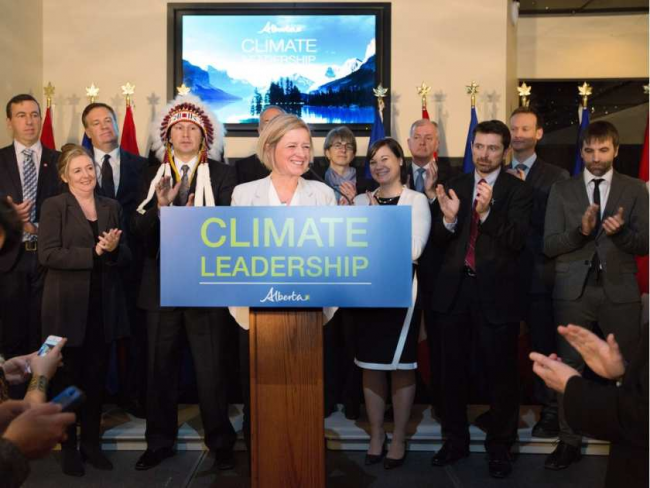Articles Menu

It was quite a sight: The CEOs of Alberta’s oilsands projects stood with NDP Premier Rachel Notley to announce Alberta’s climate plan before the climate talks in Paris. The CEOs had the widest smiles.
No wonder. Alberta’s climate plan targets the 28 per cent of Alberta’s greenhouse gases from power generation and transportation (driving), and leaves the 46 per cent of the province’s emissions from the production of oil and gas almost scot-free.
Under Alberta’s plan, oilsands and other oil and gas emissions can grow by 43 per cent and will cancel out the carbon pollution reductions in electrical power and driving. Ordinary Albertans are called upon to reduce their carbon pollution to make room for Big Oil’s expansion of oilsands emissions and profits.
Coal-fired electrical power generation will be phased out over 15 years. Only if oilsands emissions were also capped at current levels and phased out over the same period, would it be reasonable to ask ordinary Albertans to do their share through higher power and gasoline prices.
The much-ballyhooed emissions cap that Big Oil agreed to is no cap. Further, it prevents Canada from achieving the carbon emissions targets in the late Jack Layton’s climate bill.
In 2008 and 2010, the House of Commons passed Layton’s Climate Change Accountability Act to cut carbon emissions by 80 per cent below Canada’s 1990 level of 592 million tonnes (MT) by 2050. Harper’s unelected Conservative Senators defeated the act. But Justin Trudeau and Stéphane Dion, now Foreign Affairs Minister, and other Liberal MPs voted for Layton’s bill. Now they form the government, they should adopt those as Canada’s targets.
Alberta’s new climate plan stands in the way. Cutting Canada’s 1990 emissions by 80 per cent by 2050 would leave 118 MT. That’s only 18 MT above Alberta’s oilsands cap of 100 MT. If allowed to stand, oilsands emissions would take up 84 per cent of Canada’s total emissions in 2050. Canadians would have to just about shut down all other oil uses — such as driving to work — so Alberta’s oilsands output can grow.
Another way to show the incredible carbon pollution effect of the oilsands and other carbon fuel production in Alberta is this: With 4.2 million people, the province produces a little more in greenhouse gases than do Ontario and Quebec with a combined population of 22 million. That’s five times as much per capita. And it isn’t because Albertans drive much more; driving produces only 11 per cent of Alberta’s emissions.
Alberta’s plan doubles the carbon tax on oil production to a measly $30 a tonne. It’s a slap on the wrist. Alberta’s climate plan is unlikely to change Washington’s mind on the Keystone XL pipeline because it won’t make oilsands oil much cleaner.
Phasing out coal-fired electricity generation is a good step. But to reduce Alberta’s carbon pollution enough to achieve Layton’s bill, there must be three other phase-outs over the next 15 years:
Canada has enough conventional, non-fracked oil and natural gas liquids to replace insecure oil imports in Eastern Canada and supply all Canadians, but not enough to continue oil exports.
In the past year, low oil prices and lack of pipeline export capacity have led to the cancellation of 1.3 million barrels of future oilsands oil production. Rather than view the cancellations as bad news, they should be the start of phasing out the oilsands. The oilsands can’t be greened.
The way forward is to realize that a unit of carbon energy saved produces more jobs than a unit of energy dug up, burned and emitted. The 35,000 energy-related construction workers laid off in Alberta in the past year can better be employed retrofitting all buildings, and constructing high-speed inter-city rail and LRT and other conservation measures.
Why should Alberta try for another oil boom? It would only lead to another bust by ever tougher climate action by the rest of the world.
Getting the NDP’s backing on expanding the oilsands lends more credibility than Big Oil could have got from a Conservative Alberta government. No wonder Big Oil is smiling.
It’s time to reboot Layton’s dream.
Gordon Laxer is the founding director of Parkland Institute at the University of Alberta and the author of After the Sands.